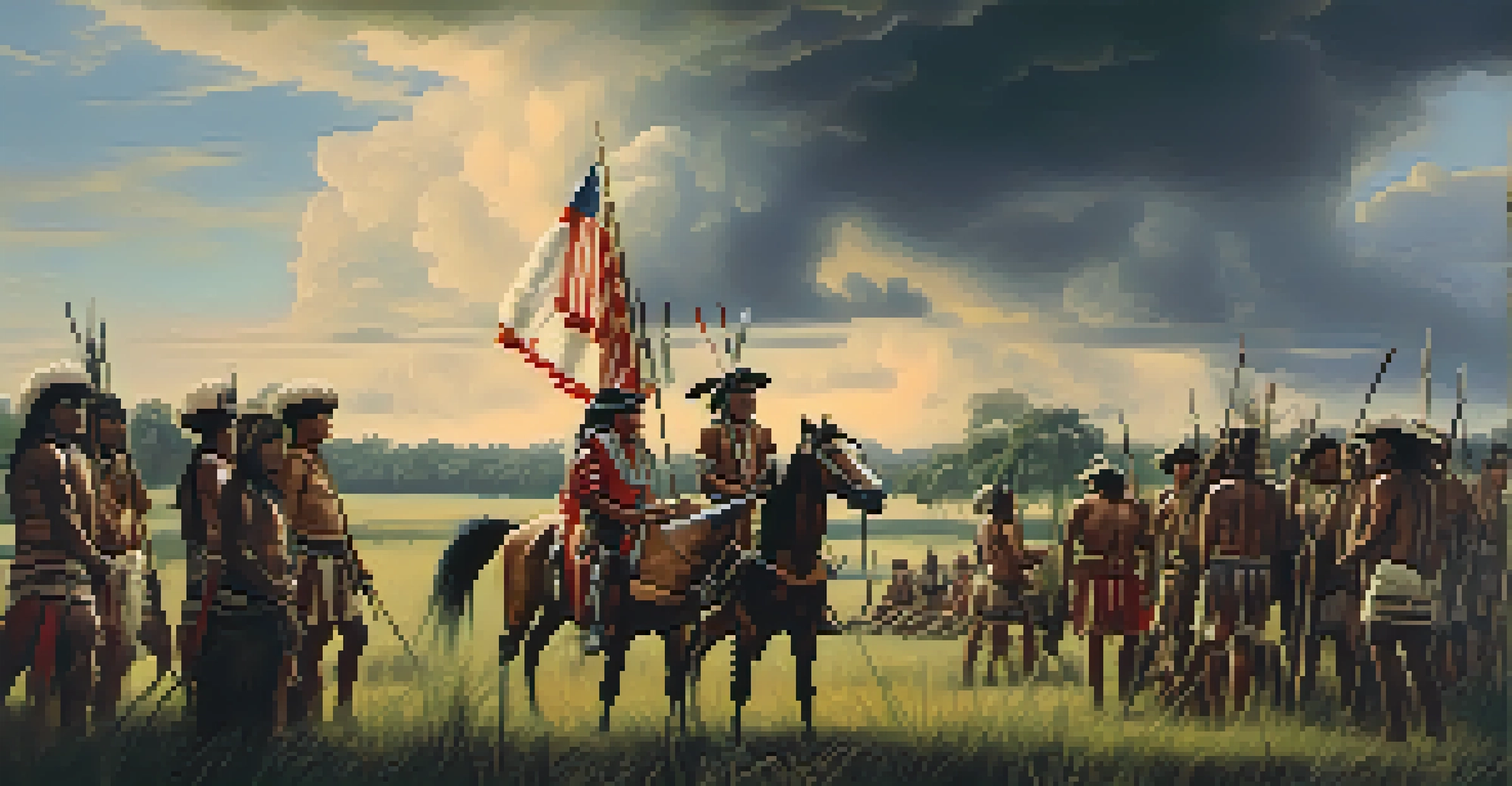Colonial Florida: The Struggle for Land and Power

The Early European Influence in Florida
Colonial Florida's story begins with early European explorers, who were drawn to the region's lush landscapes and potential for wealth. Spanish explorers, like Juan Ponce de León, arrived in the early 16th century, marking the start of significant European interest. Their motivations ranged from the quest for gold to the spread of Christianity, laying the groundwork for future conflicts over land and resources.
History is written by the victors.
As the Spanish established settlements, they encountered Native American tribes, creating a dynamic that was both cooperative and confrontational. The Timucua and Apalachee tribes, for instance, initially engaged with the newcomers but later faced displacement and violence. The cultural exchanges and clashes during this period shaped the social fabric of Colonial Florida.
The early European influence set the stage for a power struggle that would evolve over the centuries. With Spain claiming Florida, other European powers, like France and England, eyed the region hungrily. This burgeoning rivalry foreshadowed the tumultuous battles for control that would follow.
The Spanish Colonial Era: Foundations of Power
In 1565, St. Augustine was founded by the Spanish, becoming the first permanent European settlement in what is now the United States. This marked the beginning of a new era where Spanish governance asserted control over vast territories in Florida. The Spanish focused on establishing missions and converting Native Americans, which further complicated their relationships with local tribes.

During the Spanish era, the region saw the introduction of agriculture and trade, which transformed the local economy. However, this growth came at a price, as it often led to the exploitation of indigenous peoples and conflicts over land use. The Spanish military presence was essential in maintaining control and defending against rival European powers.
Colonial Conflicts Defined Florida
The clashes between European powers and Native tribes over land and resources significantly shaped Florida's colonial history.
Despite their efforts, the Spanish struggled to maintain their grip on Florida, especially as other nations began to encroach on their territory. The struggle for power laid the groundwork for a series of conflicts that would shape the future of Colonial Florida. The competition for land and resources was only just beginning.
The Role of Native Tribes in Colonial Conflicts
Native American tribes played a crucial role in the colonial conflicts of Florida, often finding themselves caught in the crossfire of European ambitions. As settlers pushed inland, tribes like the Seminole began to resist encroachment on their lands. Their resistance was not only a fight for survival but also a struggle to preserve their cultural identity.
The past cannot be changed. The future is yet in your power.
The complex relationships between tribes and European powers varied greatly, with some tribes aligning with the Spanish while others sought alliances with the British. These alliances were often tactical, aimed at retaining autonomy against encroaching settlers. The shifting allegiances illustrated the intricate web of power dynamics in Colonial Florida.
Despite their efforts to adapt and resist, Native tribes faced tremendous challenges from both colonizers and rival tribes. Over time, these conflicts would lead to significant changes in land ownership and power structures, further complicating the history of Colonial Florida. The Native American experience was a vital aspect of this struggle for land and power.
British Control: A New Era of Conflict
In 1763, following the Seven Years' War, Florida was ceded to Britain, marking a significant shift in colonial power. The British aimed to develop the territory economically, promoting agriculture and trade, which attracted more settlers. However, their arrival also intensified existing tensions with Native tribes and Spanish loyalists who remained in the region.
Under British rule, Florida experienced a new wave of settlement, which further encroached on Native lands. The introduction of plantation agriculture changed the landscape and economy, leading to conflicts over land use. These developments fueled resentment among Native tribes, who found their traditional ways of life threatened.
Spanish and British Power Struggles
The shifting control between Spanish and British rule created new tensions and conflicts, influencing the region's economic and social landscape.
British control also brought about new governance structures and legal frameworks, which often marginalized indigenous voices. The struggle for land and power continued to evolve, as various factions vied for control and influence in the region. This period of British rule set the stage for future conflicts that would ultimately lead to the return of Spanish control.
The Spanish Return: Resurgence and Resistance
The Treaty of Paris in 1783 returned Florida to Spanish control, reigniting Spanish influence in the region. The Spanish sought to rebuild their authority, emphasizing military presence and economic development. This resurgence was met with mixed reactions from settlers and Native tribes alike, as the dynamics of power continued to shift.
During this period, the Spanish attempted to integrate various cultures, including those of enslaved Africans and Native Americans, into their colonial framework. The complexities of these interactions often resulted in tensions and conflicts, as groups struggled for recognition and rights. The reestablishment of Spanish rule highlighted the ongoing struggle for power among diverse populations.
Despite their efforts, the Spanish faced challenges from American expansionism as settlers pushed into Florida. The desire for land and resources remained a driving force behind the conflicts, leading to continued resistance from Native tribes and the emergence of new dynamics. The return of Spanish rule was just another chapter in the ongoing saga of Colonial Florida.
The Rise of American Influence and Expansion
As the 19th century approached, American settlers began to encroach further into Florida, seeking new opportunities and land. This expansionist spirit, often referred to as Manifest Destiny, fueled tensions with both Spanish authorities and Native tribes. The desire for land and resources was a powerful motivator that would reshape the future of Florida.
The U.S. government's policies began to prioritize American interests, often at the expense of Native populations. Treaties were signed and then frequently broken, leading to further displacement and conflict. The struggle for power shifted as the United States sought to assert control over the territory, disregarding the complexities of the existing social fabric.
Impact of Native Resistance
Native American tribes played a crucial role in resisting encroachment, highlighting their struggle for identity and autonomy amidst colonial expansion.
This era of expansion also saw the rise of resistance movements among Native tribes, culminating in conflicts such as the Seminole Wars. These battles were emblematic of the ongoing struggle for land, identity, and autonomy. The American influence in Florida marked a significant turning point in the state's history.
Legacy of Colonial Florida: Lessons in Power Dynamics
The history of Colonial Florida is a rich tapestry woven from the struggles of various powers and peoples. The ongoing conflicts over land and resources reveal the complexities of colonial dynamics and the lasting impacts of these encounters. Each group, from European powers to Native tribes, contributed to a narrative filled with resilience and resistance.
Understanding this legacy is crucial for recognizing the historical injustices faced by Native populations and the ongoing ramifications of colonialism. The lessons learned from Colonial Florida remind us of the importance of acknowledging diverse voices and perspectives in history. This awareness can guide contemporary discussions about land rights and cultural identity.

As we reflect on the struggles for land and power in Colonial Florida, we can appreciate the resilience of its people and the intricate history that shaped the region. The echoes of these past conflicts continue to resonate today, reminding us of the complexities involved in governance, identity, and the quest for belonging.